EXPS 410: Holocaust Assignment - Inside Hana's Suitcase & Night
VerifiedAdded on 2022/08/13
|8
|1840
|23
Homework Assignment
AI Summary
This assignment solution provides detailed answers to questions based on the video 'Inside Hana's Suitcase' and Elie Wiesel's 'Night.' The first part analyzes the establishment of the Holocaust Education Research Centre, the information found on Hana's suitcase, and the restrictions placed on Jews. It also explores Hana's aspirations, conditions in Terezin, the significance of markings on a transport list, and George Brady's descriptions of the transport to Auschwitz. The second part focuses on 'Night,' addressing the edicts issued by the Nazis, Wiesel's experiences at Birkenau, the treatment of prisoners, and the horrors of executions and forced marches. The solution also covers the events at Buchenwald, the loss of Wiesel's father, and the resistance efforts. The assignment highlights the suffering and resilience of those affected by the Holocaust, providing a comprehensive understanding of the historical context and personal narratives.
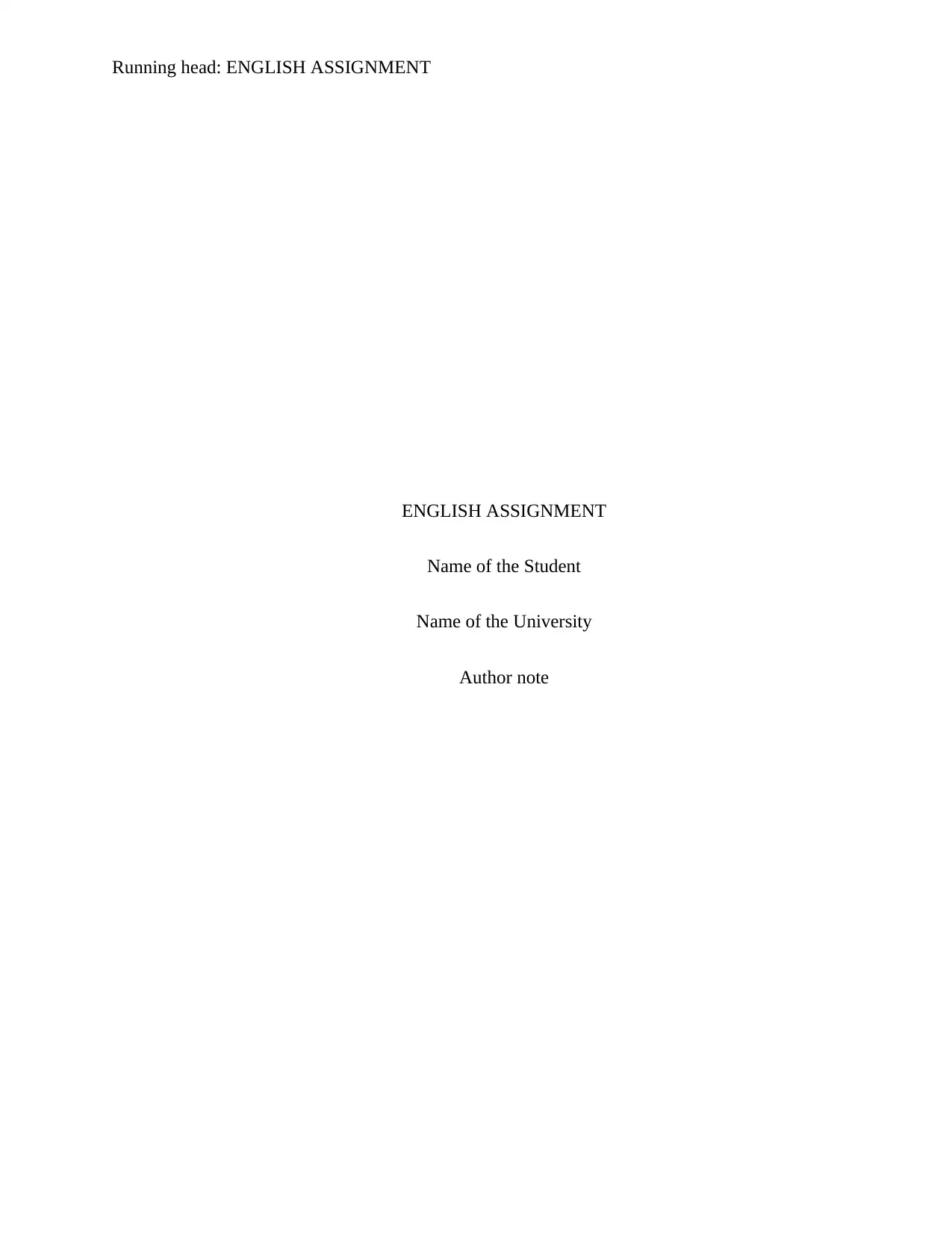
Running head: ENGLISH ASSIGNMENT
ENGLISH ASSIGNMENT
Name of the Student
Name of the University
Author note
ENGLISH ASSIGNMENT
Name of the Student
Name of the University
Author note
Paraphrase This Document
Need a fresh take? Get an instant paraphrase of this document with our AI Paraphraser
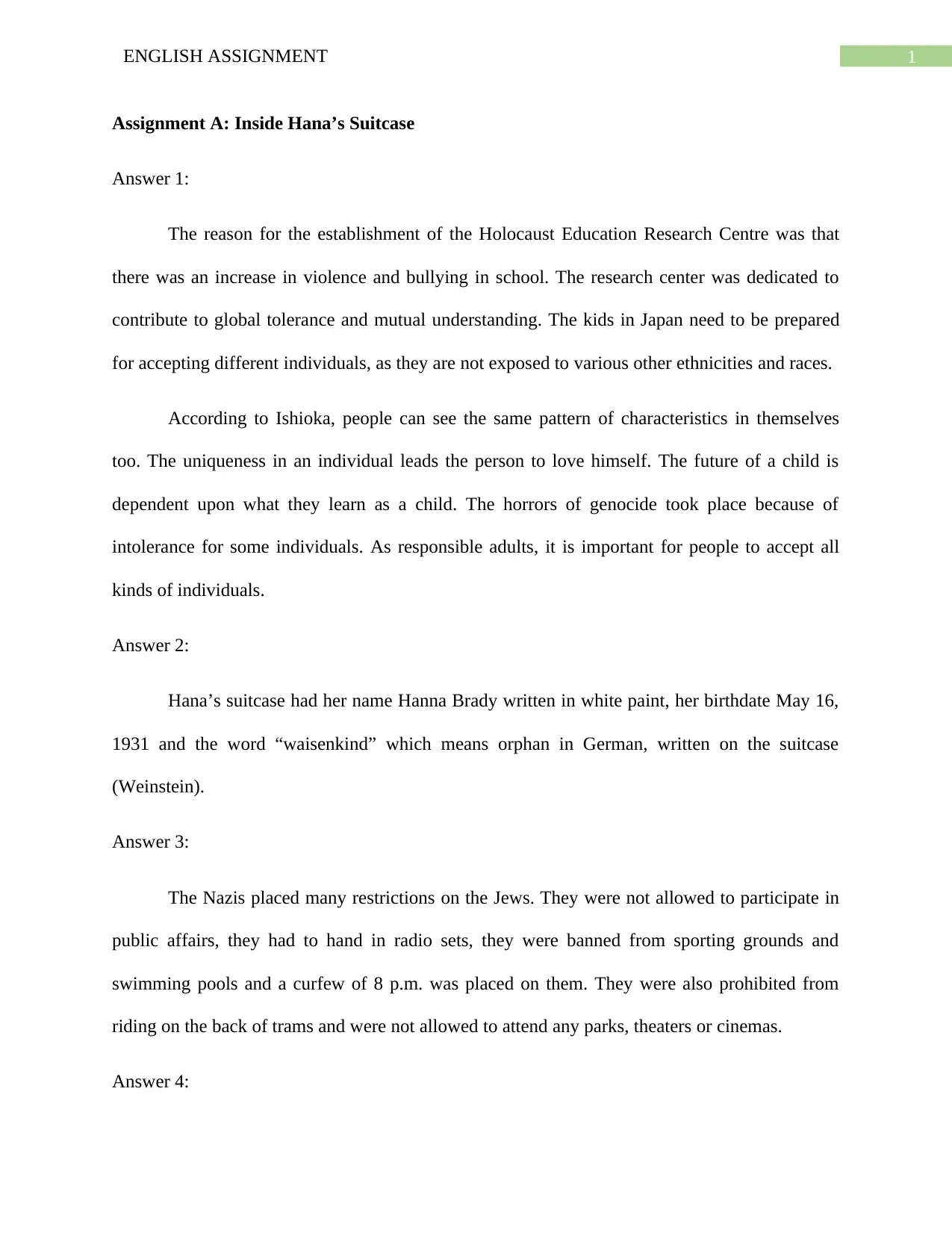
1ENGLISH ASSIGNMENT
Assignment A: Inside Hana’s Suitcase
Answer 1:
The reason for the establishment of the Holocaust Education Research Centre was that
there was an increase in violence and bullying in school. The research center was dedicated to
contribute to global tolerance and mutual understanding. The kids in Japan need to be prepared
for accepting different individuals, as they are not exposed to various other ethnicities and races.
According to Ishioka, people can see the same pattern of characteristics in themselves
too. The uniqueness in an individual leads the person to love himself. The future of a child is
dependent upon what they learn as a child. The horrors of genocide took place because of
intolerance for some individuals. As responsible adults, it is important for people to accept all
kinds of individuals.
Answer 2:
Hana’s suitcase had her name Hanna Brady written in white paint, her birthdate May 16,
1931 and the word “waisenkind” which means orphan in German, written on the suitcase
(Weinstein).
Answer 3:
The Nazis placed many restrictions on the Jews. They were not allowed to participate in
public affairs, they had to hand in radio sets, they were banned from sporting grounds and
swimming pools and a curfew of 8 p.m. was placed on them. They were also prohibited from
riding on the back of trams and were not allowed to attend any parks, theaters or cinemas.
Answer 4:
Assignment A: Inside Hana’s Suitcase
Answer 1:
The reason for the establishment of the Holocaust Education Research Centre was that
there was an increase in violence and bullying in school. The research center was dedicated to
contribute to global tolerance and mutual understanding. The kids in Japan need to be prepared
for accepting different individuals, as they are not exposed to various other ethnicities and races.
According to Ishioka, people can see the same pattern of characteristics in themselves
too. The uniqueness in an individual leads the person to love himself. The future of a child is
dependent upon what they learn as a child. The horrors of genocide took place because of
intolerance for some individuals. As responsible adults, it is important for people to accept all
kinds of individuals.
Answer 2:
Hana’s suitcase had her name Hanna Brady written in white paint, her birthdate May 16,
1931 and the word “waisenkind” which means orphan in German, written on the suitcase
(Weinstein).
Answer 3:
The Nazis placed many restrictions on the Jews. They were not allowed to participate in
public affairs, they had to hand in radio sets, they were banned from sporting grounds and
swimming pools and a curfew of 8 p.m. was placed on them. They were also prohibited from
riding on the back of trams and were not allowed to attend any parks, theaters or cinemas.
Answer 4:
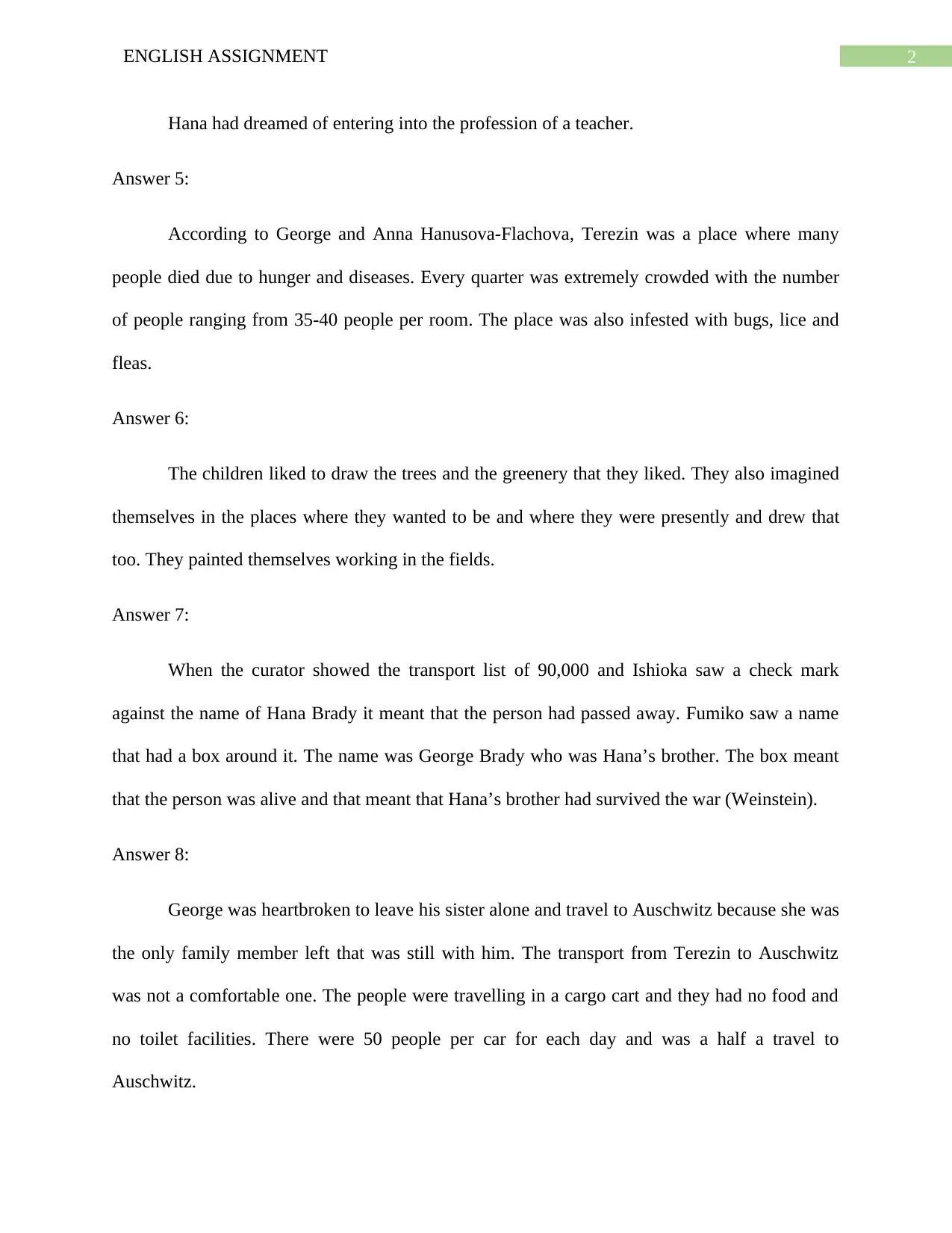
2ENGLISH ASSIGNMENT
Hana had dreamed of entering into the profession of a teacher.
Answer 5:
According to George and Anna Hanusova-Flachova, Terezin was a place where many
people died due to hunger and diseases. Every quarter was extremely crowded with the number
of people ranging from 35-40 people per room. The place was also infested with bugs, lice and
fleas.
Answer 6:
The children liked to draw the trees and the greenery that they liked. They also imagined
themselves in the places where they wanted to be and where they were presently and drew that
too. They painted themselves working in the fields.
Answer 7:
When the curator showed the transport list of 90,000 and Ishioka saw a check mark
against the name of Hana Brady it meant that the person had passed away. Fumiko saw a name
that had a box around it. The name was George Brady who was Hana’s brother. The box meant
that the person was alive and that meant that Hana’s brother had survived the war (Weinstein).
Answer 8:
George was heartbroken to leave his sister alone and travel to Auschwitz because she was
the only family member left that was still with him. The transport from Terezin to Auschwitz
was not a comfortable one. The people were travelling in a cargo cart and they had no food and
no toilet facilities. There were 50 people per car for each day and was a half a travel to
Auschwitz.
Hana had dreamed of entering into the profession of a teacher.
Answer 5:
According to George and Anna Hanusova-Flachova, Terezin was a place where many
people died due to hunger and diseases. Every quarter was extremely crowded with the number
of people ranging from 35-40 people per room. The place was also infested with bugs, lice and
fleas.
Answer 6:
The children liked to draw the trees and the greenery that they liked. They also imagined
themselves in the places where they wanted to be and where they were presently and drew that
too. They painted themselves working in the fields.
Answer 7:
When the curator showed the transport list of 90,000 and Ishioka saw a check mark
against the name of Hana Brady it meant that the person had passed away. Fumiko saw a name
that had a box around it. The name was George Brady who was Hana’s brother. The box meant
that the person was alive and that meant that Hana’s brother had survived the war (Weinstein).
Answer 8:
George was heartbroken to leave his sister alone and travel to Auschwitz because she was
the only family member left that was still with him. The transport from Terezin to Auschwitz
was not a comfortable one. The people were travelling in a cargo cart and they had no food and
no toilet facilities. There were 50 people per car for each day and was a half a travel to
Auschwitz.
⊘ This is a preview!⊘
Do you want full access?
Subscribe today to unlock all pages.

Trusted by 1+ million students worldwide
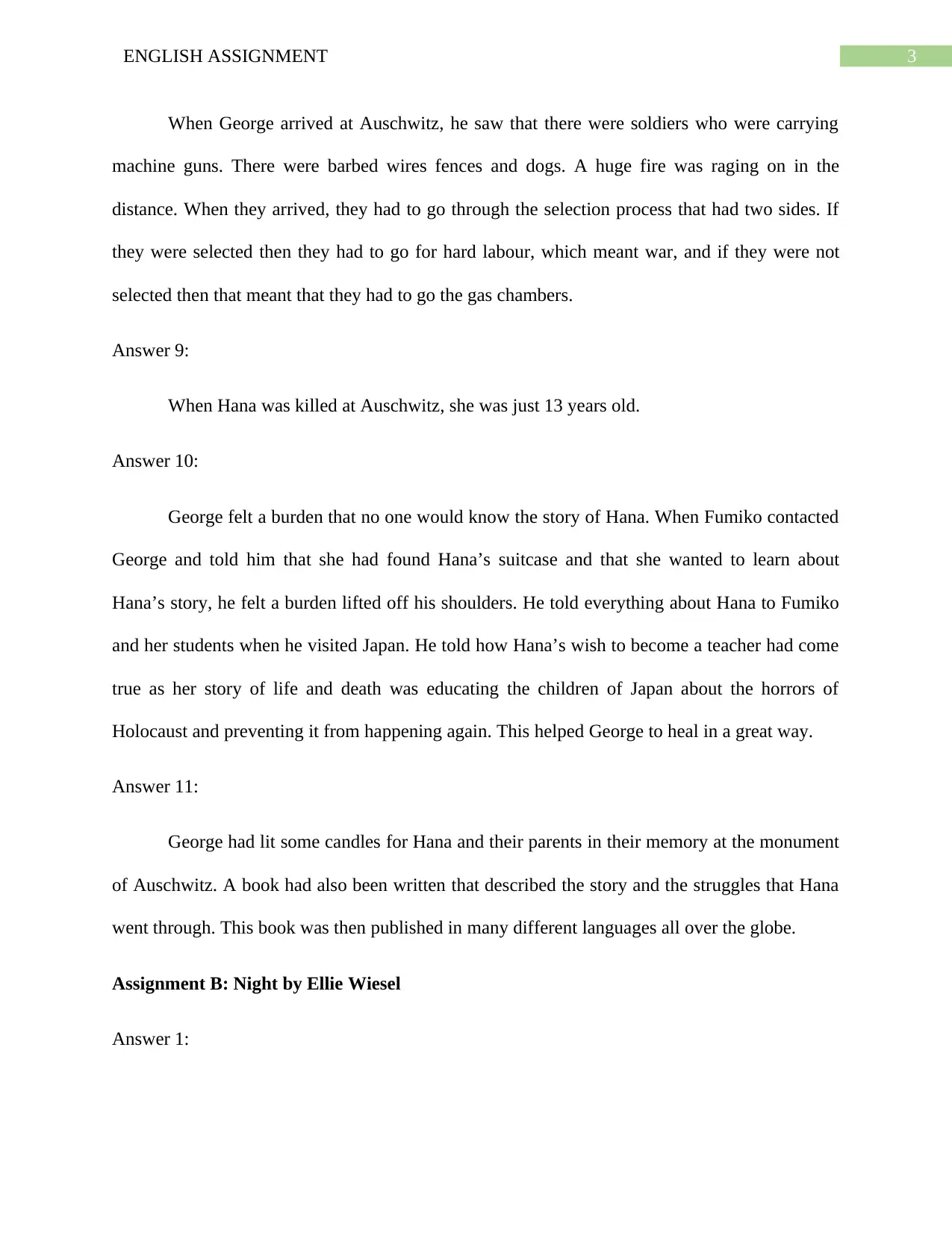
3ENGLISH ASSIGNMENT
When George arrived at Auschwitz, he saw that there were soldiers who were carrying
machine guns. There were barbed wires fences and dogs. A huge fire was raging on in the
distance. When they arrived, they had to go through the selection process that had two sides. If
they were selected then they had to go for hard labour, which meant war, and if they were not
selected then that meant that they had to go the gas chambers.
Answer 9:
When Hana was killed at Auschwitz, she was just 13 years old.
Answer 10:
George felt a burden that no one would know the story of Hana. When Fumiko contacted
George and told him that she had found Hana’s suitcase and that she wanted to learn about
Hana’s story, he felt a burden lifted off his shoulders. He told everything about Hana to Fumiko
and her students when he visited Japan. He told how Hana’s wish to become a teacher had come
true as her story of life and death was educating the children of Japan about the horrors of
Holocaust and preventing it from happening again. This helped George to heal in a great way.
Answer 11:
George had lit some candles for Hana and their parents in their memory at the monument
of Auschwitz. A book had also been written that described the story and the struggles that Hana
went through. This book was then published in many different languages all over the globe.
Assignment B: Night by Ellie Wiesel
Answer 1:
When George arrived at Auschwitz, he saw that there were soldiers who were carrying
machine guns. There were barbed wires fences and dogs. A huge fire was raging on in the
distance. When they arrived, they had to go through the selection process that had two sides. If
they were selected then they had to go for hard labour, which meant war, and if they were not
selected then that meant that they had to go the gas chambers.
Answer 9:
When Hana was killed at Auschwitz, she was just 13 years old.
Answer 10:
George felt a burden that no one would know the story of Hana. When Fumiko contacted
George and told him that she had found Hana’s suitcase and that she wanted to learn about
Hana’s story, he felt a burden lifted off his shoulders. He told everything about Hana to Fumiko
and her students when he visited Japan. He told how Hana’s wish to become a teacher had come
true as her story of life and death was educating the children of Japan about the horrors of
Holocaust and preventing it from happening again. This helped George to heal in a great way.
Answer 11:
George had lit some candles for Hana and their parents in their memory at the monument
of Auschwitz. A book had also been written that described the story and the struggles that Hana
went through. This book was then published in many different languages all over the globe.
Assignment B: Night by Ellie Wiesel
Answer 1:
Paraphrase This Document
Need a fresh take? Get an instant paraphrase of this document with our AI Paraphraser
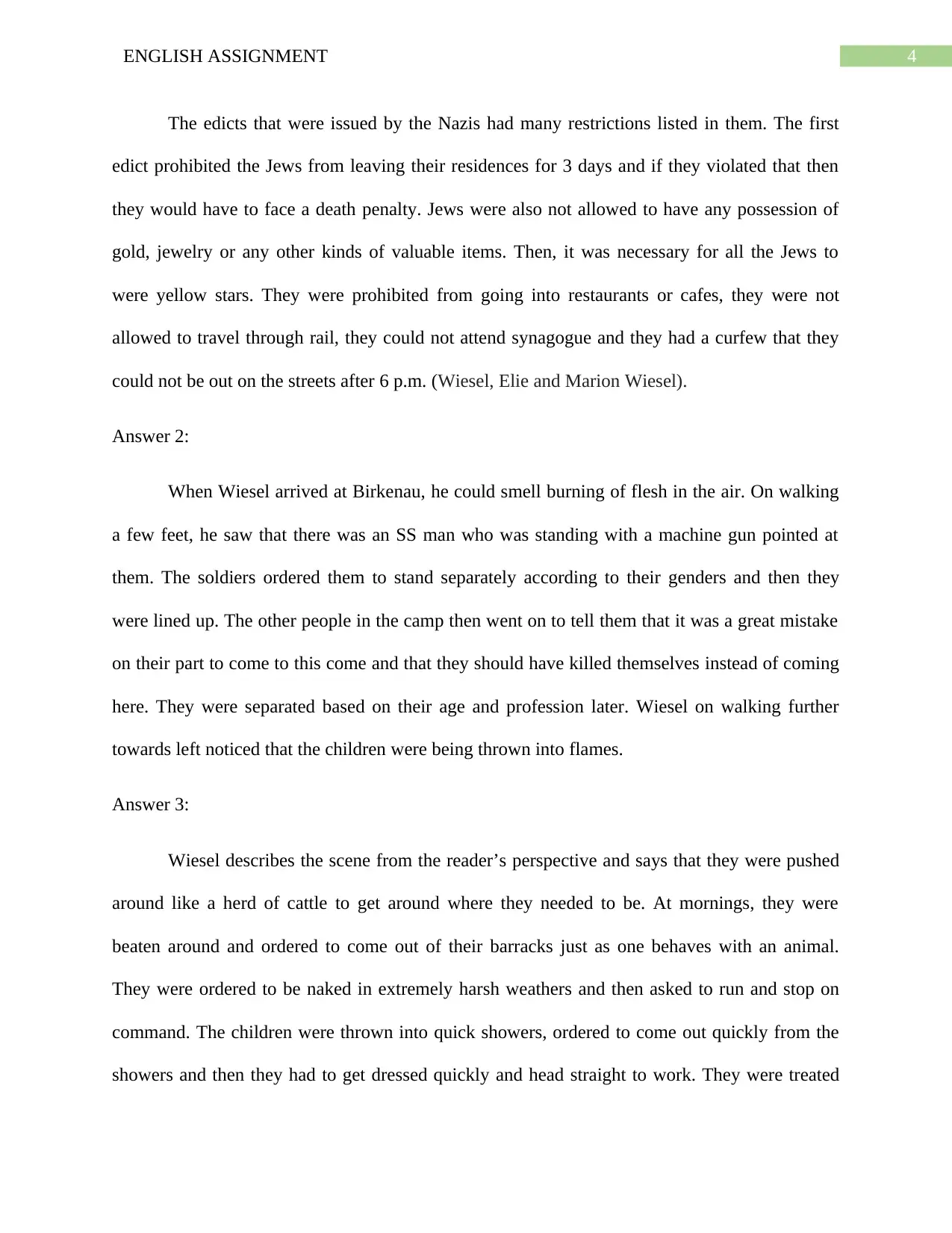
4ENGLISH ASSIGNMENT
The edicts that were issued by the Nazis had many restrictions listed in them. The first
edict prohibited the Jews from leaving their residences for 3 days and if they violated that then
they would have to face a death penalty. Jews were also not allowed to have any possession of
gold, jewelry or any other kinds of valuable items. Then, it was necessary for all the Jews to
were yellow stars. They were prohibited from going into restaurants or cafes, they were not
allowed to travel through rail, they could not attend synagogue and they had a curfew that they
could not be out on the streets after 6 p.m. (Wiesel, Elie and Marion Wiesel).
Answer 2:
When Wiesel arrived at Birkenau, he could smell burning of flesh in the air. On walking
a few feet, he saw that there was an SS man who was standing with a machine gun pointed at
them. The soldiers ordered them to stand separately according to their genders and then they
were lined up. The other people in the camp then went on to tell them that it was a great mistake
on their part to come to this come and that they should have killed themselves instead of coming
here. They were separated based on their age and profession later. Wiesel on walking further
towards left noticed that the children were being thrown into flames.
Answer 3:
Wiesel describes the scene from the reader’s perspective and says that they were pushed
around like a herd of cattle to get around where they needed to be. At mornings, they were
beaten around and ordered to come out of their barracks just as one behaves with an animal.
They were ordered to be naked in extremely harsh weathers and then asked to run and stop on
command. The children were thrown into quick showers, ordered to come out quickly from the
showers and then they had to get dressed quickly and head straight to work. They were treated
The edicts that were issued by the Nazis had many restrictions listed in them. The first
edict prohibited the Jews from leaving their residences for 3 days and if they violated that then
they would have to face a death penalty. Jews were also not allowed to have any possession of
gold, jewelry or any other kinds of valuable items. Then, it was necessary for all the Jews to
were yellow stars. They were prohibited from going into restaurants or cafes, they were not
allowed to travel through rail, they could not attend synagogue and they had a curfew that they
could not be out on the streets after 6 p.m. (Wiesel, Elie and Marion Wiesel).
Answer 2:
When Wiesel arrived at Birkenau, he could smell burning of flesh in the air. On walking
a few feet, he saw that there was an SS man who was standing with a machine gun pointed at
them. The soldiers ordered them to stand separately according to their genders and then they
were lined up. The other people in the camp then went on to tell them that it was a great mistake
on their part to come to this come and that they should have killed themselves instead of coming
here. They were separated based on their age and profession later. Wiesel on walking further
towards left noticed that the children were being thrown into flames.
Answer 3:
Wiesel describes the scene from the reader’s perspective and says that they were pushed
around like a herd of cattle to get around where they needed to be. At mornings, they were
beaten around and ordered to come out of their barracks just as one behaves with an animal.
They were ordered to be naked in extremely harsh weathers and then asked to run and stop on
command. The children were thrown into quick showers, ordered to come out quickly from the
showers and then they had to get dressed quickly and head straight to work. They were treated
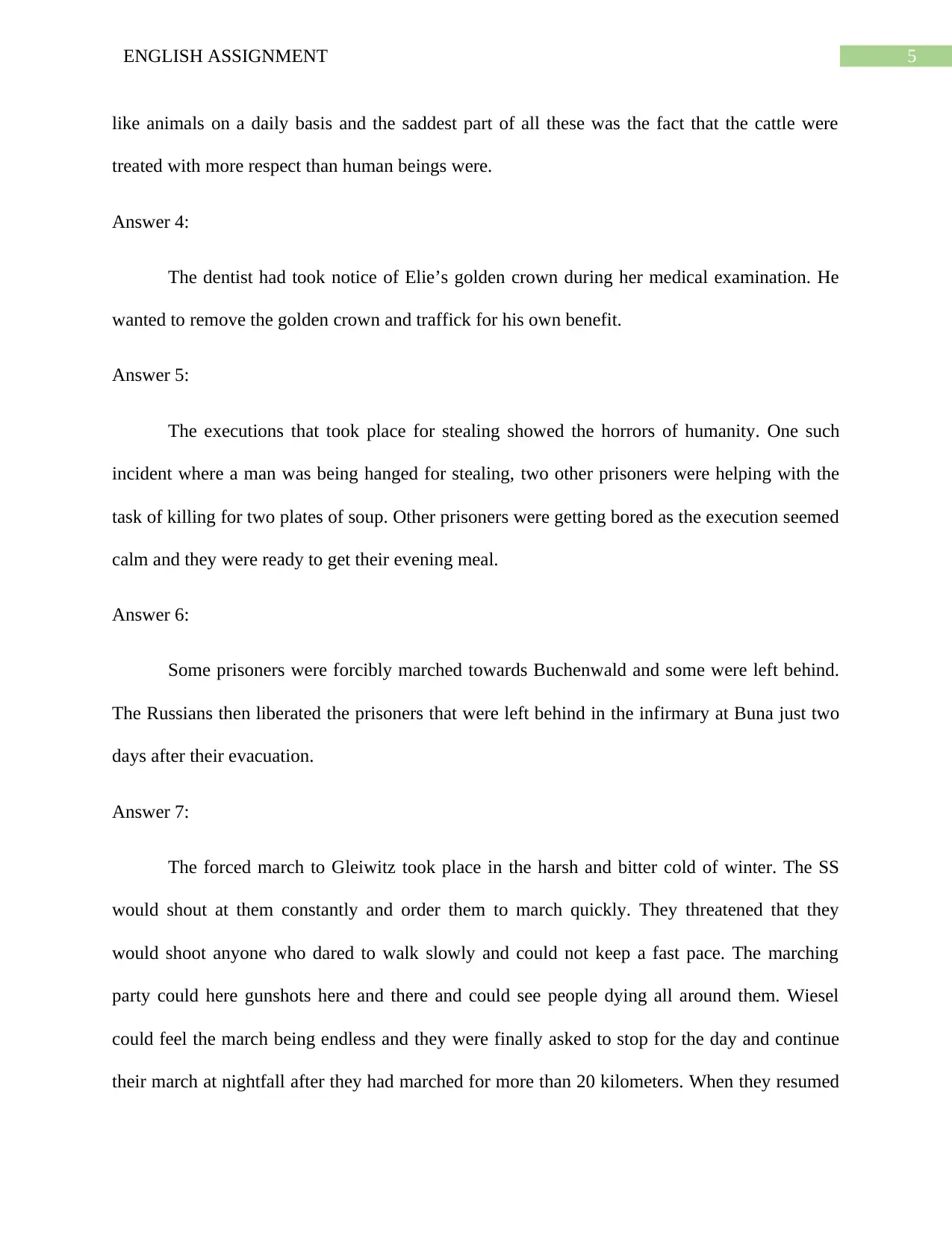
5ENGLISH ASSIGNMENT
like animals on a daily basis and the saddest part of all these was the fact that the cattle were
treated with more respect than human beings were.
Answer 4:
The dentist had took notice of Elie’s golden crown during her medical examination. He
wanted to remove the golden crown and traffick for his own benefit.
Answer 5:
The executions that took place for stealing showed the horrors of humanity. One such
incident where a man was being hanged for stealing, two other prisoners were helping with the
task of killing for two plates of soup. Other prisoners were getting bored as the execution seemed
calm and they were ready to get their evening meal.
Answer 6:
Some prisoners were forcibly marched towards Buchenwald and some were left behind.
The Russians then liberated the prisoners that were left behind in the infirmary at Buna just two
days after their evacuation.
Answer 7:
The forced march to Gleiwitz took place in the harsh and bitter cold of winter. The SS
would shout at them constantly and order them to march quickly. They threatened that they
would shoot anyone who dared to walk slowly and could not keep a fast pace. The marching
party could here gunshots here and there and could see people dying all around them. Wiesel
could feel the march being endless and they were finally asked to stop for the day and continue
their march at nightfall after they had marched for more than 20 kilometers. When they resumed
like animals on a daily basis and the saddest part of all these was the fact that the cattle were
treated with more respect than human beings were.
Answer 4:
The dentist had took notice of Elie’s golden crown during her medical examination. He
wanted to remove the golden crown and traffick for his own benefit.
Answer 5:
The executions that took place for stealing showed the horrors of humanity. One such
incident where a man was being hanged for stealing, two other prisoners were helping with the
task of killing for two plates of soup. Other prisoners were getting bored as the execution seemed
calm and they were ready to get their evening meal.
Answer 6:
Some prisoners were forcibly marched towards Buchenwald and some were left behind.
The Russians then liberated the prisoners that were left behind in the infirmary at Buna just two
days after their evacuation.
Answer 7:
The forced march to Gleiwitz took place in the harsh and bitter cold of winter. The SS
would shout at them constantly and order them to march quickly. They threatened that they
would shoot anyone who dared to walk slowly and could not keep a fast pace. The marching
party could here gunshots here and there and could see people dying all around them. Wiesel
could feel the march being endless and they were finally asked to stop for the day and continue
their march at nightfall after they had marched for more than 20 kilometers. When they resumed
⊘ This is a preview!⊘
Do you want full access?
Subscribe today to unlock all pages.

Trusted by 1+ million students worldwide
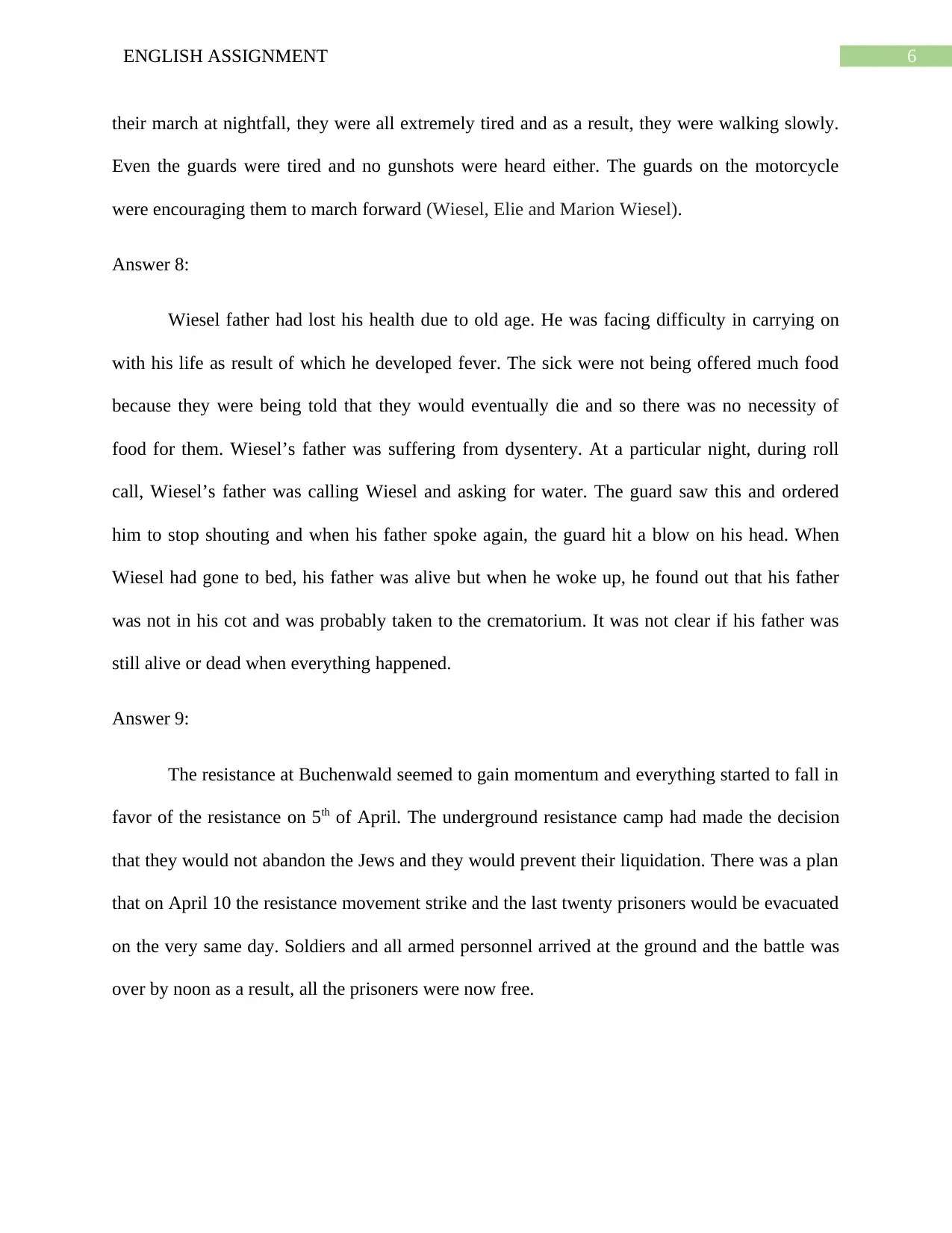
6ENGLISH ASSIGNMENT
their march at nightfall, they were all extremely tired and as a result, they were walking slowly.
Even the guards were tired and no gunshots were heard either. The guards on the motorcycle
were encouraging them to march forward (Wiesel, Elie and Marion Wiesel).
Answer 8:
Wiesel father had lost his health due to old age. He was facing difficulty in carrying on
with his life as result of which he developed fever. The sick were not being offered much food
because they were being told that they would eventually die and so there was no necessity of
food for them. Wiesel’s father was suffering from dysentery. At a particular night, during roll
call, Wiesel’s father was calling Wiesel and asking for water. The guard saw this and ordered
him to stop shouting and when his father spoke again, the guard hit a blow on his head. When
Wiesel had gone to bed, his father was alive but when he woke up, he found out that his father
was not in his cot and was probably taken to the crematorium. It was not clear if his father was
still alive or dead when everything happened.
Answer 9:
The resistance at Buchenwald seemed to gain momentum and everything started to fall in
favor of the resistance on 5th of April. The underground resistance camp had made the decision
that they would not abandon the Jews and they would prevent their liquidation. There was a plan
that on April 10 the resistance movement strike and the last twenty prisoners would be evacuated
on the very same day. Soldiers and all armed personnel arrived at the ground and the battle was
over by noon as a result, all the prisoners were now free.
their march at nightfall, they were all extremely tired and as a result, they were walking slowly.
Even the guards were tired and no gunshots were heard either. The guards on the motorcycle
were encouraging them to march forward (Wiesel, Elie and Marion Wiesel).
Answer 8:
Wiesel father had lost his health due to old age. He was facing difficulty in carrying on
with his life as result of which he developed fever. The sick were not being offered much food
because they were being told that they would eventually die and so there was no necessity of
food for them. Wiesel’s father was suffering from dysentery. At a particular night, during roll
call, Wiesel’s father was calling Wiesel and asking for water. The guard saw this and ordered
him to stop shouting and when his father spoke again, the guard hit a blow on his head. When
Wiesel had gone to bed, his father was alive but when he woke up, he found out that his father
was not in his cot and was probably taken to the crematorium. It was not clear if his father was
still alive or dead when everything happened.
Answer 9:
The resistance at Buchenwald seemed to gain momentum and everything started to fall in
favor of the resistance on 5th of April. The underground resistance camp had made the decision
that they would not abandon the Jews and they would prevent their liquidation. There was a plan
that on April 10 the resistance movement strike and the last twenty prisoners would be evacuated
on the very same day. Soldiers and all armed personnel arrived at the ground and the battle was
over by noon as a result, all the prisoners were now free.
Paraphrase This Document
Need a fresh take? Get an instant paraphrase of this document with our AI Paraphraser

7ENGLISH ASSIGNMENT
References
Weinstein, L. (Producer). Inside Hana’s Suitcase. CBC Television, 2009.
Wiesel, Elie, and Marion Wiesel. Night. Special Materials Services, Manitoba Education, 2007.
References
Weinstein, L. (Producer). Inside Hana’s Suitcase. CBC Television, 2009.
Wiesel, Elie, and Marion Wiesel. Night. Special Materials Services, Manitoba Education, 2007.
1 out of 8
Your All-in-One AI-Powered Toolkit for Academic Success.
+13062052269
info@desklib.com
Available 24*7 on WhatsApp / Email
![[object Object]](/_next/static/media/star-bottom.7253800d.svg)
Unlock your academic potential
Copyright © 2020–2025 A2Z Services. All Rights Reserved. Developed and managed by ZUCOL.

